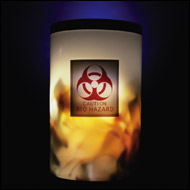
University Launches Biodefense Graduate Programs
Responding to a critical need for highly skilled professionals in the $6 billion biodefense industry, George Mason began to offer graduate programs in biodefense this fall. Applications are now being accepted for admission into the master's, doctoral, and certificate programs.
The first of their kind in the nation and abroad, these programs provide students with a background in the foundations of the science and technology of biodefense, threat analysis of biological weapons, and specialized areas of medical defense. Students also have a unique opportunity to study under world-renowned scientists who offer unparalleled expertise found only in the university's National Center for Biodefense, including the center's executive directors, Ken Alibek and Charles Bailey.
Alibek, executive director for education, has more than 20 years of experience in biological weapons threat analysis; antibacterial and antiviral drug development; development of regimens for prophylaxis and treatment of diseases caused by biological weapons; and mass casualty handling. He previously served as first deputy chief of the civilian branch of the former Soviet Union's offensive biological weapons program.
Bailey, executive director for science, spent 25 years in research and development and managerial roles for the U.S. Army in the field of infectious diseases and biological warfare defense. He served as a research scientist, deputy commander for research, deputy commander, and commander at the U.S. Army Medical Research Institute of Infectious Diseases at Ft. Detrick, Md.
"Our program is specifically focused on making the United States safer," Alibek says, "while educating a new generation of highly skilled and experienced professionals in all areas of biological weapons and biological terrorism defense."
Developed for students interested in the agricultural or medical defense aspects of bioterrorism, or the legislative or engineering aspects of biodefense, these programs also are geared toward professionals employed in the biodefense industry or the federal government.
Students may choose from four concentrations in the master's and doctoral programs: biological weapons threat analysis and medical defense, biological weapons threat analysis and engineering defense/countermeasure, biological weapons threat analysis and nonproliferation, and biological weapons threat analysis and counterterrorism/law enforcement.
In addition, two certificate programs are available for working professionals who may wish to obtain graduate-level training in the field of biodefense without earning an advanced degree. The program in medical biodefense is designed for students with a background in the sciences and provides them with a sound knowledge of agents of biological warfare, epidemiology, immunology, toxicology, and approaches to biological warfare medical treatment and response.
The history of biological agent usage, nonproliferation, bioterrorist attack response, counterterrorism, and civil rights are stressed in the core courses of the biodefense strategic studies certificate program, which is intended for students interested in biological threat analysis and defense.
"The National Center for Biodefense offers unique talent and expertise in medical defense and threat analysis mitigation that is unavailable at other academic institutions," says Bailey. "Our strategic location in the Washington, D.C., metropolitan area allows convenient access for federal government and defense-related industry professionals."
For more information, contact Monique Van Hoek, graduate coordinator
for the biodefense programs, at (703) 993-4273 or [email protected].
